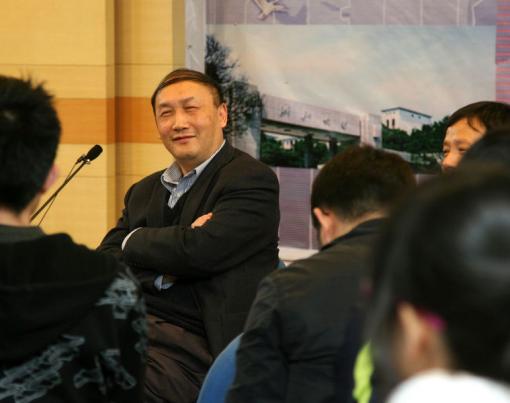
New NSFC chief Wei Yang, meeting with students.
Credit: Shaoqing Lu, Courtesy of Wei Yang
Wei Yang Ph.D.'85 Sc.D.'12 hon., an internationally celebrated engineer and materials science researcher, educator, and administrator, has been named president of China's National Natural Sciences Foundation, the nation's top science agency. He takes the helm of an organization that last year allocated $2.8 billion to fund scientific activity. In a recent interview with Science magazine, Yang said he hopes to increase the agency's funding substantially.
"China has to transition from an economic powerhouse to a technological powerhouse and then to a scientific and cultural powerhouse," he said. "To achieve this goal, we will need many scientists, and we need to convince the government that it should provide more funding to the NSFC."
Before the NSFC, Yang was president of Zhejiang University and head of the Chinese Academy of Sciences Technological Science Division. He was the youngest person ever to achieve the rank of full professor of engineering at Tsinghua University, which he did just four years after his graduation from Brown. Born in Beijing, Yang was educated in the United States and China (B.S., Northwestern Polytechnic University, 1976; M.S., Tsinghua University, 1981; Ph.D., Brown University, 1985).
In addition to continuing an active and very productive career as a research engineer in fracture mechanics, mechatronic reliability, and micro/nanomechanics (11 books and 211 technical papers in internationally refereed journals), Yang has served in a number of national and international positions as an educator and administrator. He became director of the Failure Mechanics Laboratory of the Chinese Ministry of Education in 1993. For seven years (1997–2004), he headed the Department of Engineering Mechanics at Tsinghua, also serving for a time as executive dean of the Aerospace School. From 2004 to 2006, he served as director-general of the Academic Degrees Committee of the State Council of China and also headed the Directorate of Graduate Education. He began as president of Zhejiang University, one of China's largest and oldest universities, in 2006.
As head of the Chinese Academy of Sciences Technological Science Division, Yang has had extensive international scientific experience. He has served as regional editor for several journals in the field of composite materials and has been on the editorial boards of the International Journal of Fracture, Fatigue & Fracture of Engineering Materials & Structures, and the Archive of Applied Mechanics, among several others.
Early in 2009, Yang became widely known for a stern and dedicated fight against scientific misconduct, dealing strictly with researchers found to have engaged in misconduct and proactively developing training programs to support scientific integrity. Organizations and journals,Nature among them, praised his zero tolerance policies.
Yang has supported and worked for collaborations with universities in the United States, Germany, the Netherlands, Singapore and elsewhere. His own postgraduate students — more than 40 of them — have extended his international reach. More than 10 of them hold engineering faculty positions in the United States and Europe. He has been honored extensively for his efforts, including the 2009 Brown University Engineering Alumni Medal (BEAM).